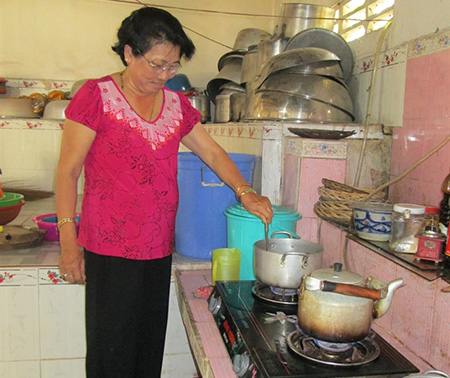Sunday, 22/02/2026 | 07:11 GMT+7
After 18 months of implementation of Low-carbon agricultural support project, Ben Tre province has completed 2,380/3,600 biogas projects with a capacity of up to 50m3.
With the current progress, by September 2016, the project will have been fulfilled (planned to 2018).
Mr. Nguyen Thai Nghia, coordinator of Management Board of low-carbon agricultural support project of Ben Tre province, said that biogas projects had positive impacts on the life of each farmer households and the community. Farmers make use of gas fuel to create energy, serving daily activities such as cooking, lighting and running electrical generators, and then saving a huge cost.
Advantages of the project are cutting environmental pollution and protection of the health of farmers and the community. Sewage and sludge are organic fertilizers to be effectively used to irrigate and manure cultivated plants without polluting the environment. With the dung of 5 buffalos or 10 pigs or 100 poultries, farmers can build a farm-scale biogas project.

Utilization of gas fuel of biogas tank to serve daily activities in Ben Tre
The economic value brought by biogas is considerable; only in terms of cooking, using biogas reduces the cost of living by VND3 million/household/year. Sewage is used to irrigate plants, then replacing largely chemical fertilizer. After only 2 years of building biogas projects, invested capital can be deducted sufficiently. Cattle breeding will lower the actual cost by around 7%.
On the other hand, by-products of biogas digester models including sewage and fertilizer have practical values to agricultural production; for instance, fertilizers are used to irrigate plants, grow mushrooms and seeds; other by-products are used as complementary food for cattle or used to grow fish and earthworm.
Research results of agriculture experts show that using liquid by-products of biogas digester models which are atomized on leaves helps to increase plant productivity by averagely around 10% in comparison with the case of fertilizing directly into soil. Combined application of organic and inorganic fertilizers will increase the solubility of chemical fertilizers and absorption of soil.
Concurrently, this method limits decline in nutrition and increases NPK utilization efficiency by 10% - 30%. In addition, it also stimulates activities of microorganism, retains fertilizer in soil and makes soil unconsolidated avoid being compact due to too much fertilization of artificial manure.
According to calculation of farmers growing green grape fruits in Ben Tre, fertilizer cost decreases by VND6-7 million/ha each year. With closed structure and absolute salvage of livestock waste in life activities and production, biogas projects contribute to solving environmental pollution.
Mrs. Phan Thi Thu Suong, Director of Management Board of Low-carbon agricultural support project of Ben Tre province, said that in order to achieve the aforementioned results, during the past time, the Management Board has coordinated with agricultural encouragement systems and other social organizations, unions to stimulate activities of propagandizing and mobilizing people to participate in the project.
Up to now, Ben Tre province has organized 96 workshops on introduction to the project and guide to the operation of biogas projects for 3,274 participants; founded 13 groups of building workers, 5-10 people in each group. With the current progress of implementation, the project will be completed in 2 years ahead of plan.
Ngoc Anh








 Consultation on the methodology for developing and updating energy consumption standards for four major industrial sectors
Consultation on the methodology for developing and updating energy consumption standards for four major industrial sectors
 Opening of the 2025 Energy-Efficient Equipment and Green Transition Exhibition Fair
Opening of the 2025 Energy-Efficient Equipment and Green Transition Exhibition Fair
 Energy-saving solutions and green transition promotion
Energy-saving solutions and green transition promotion
 The 9th VEPG Steering Committee Meeting: Strengthening Coordination for Viet Nam’s Just Energy Transition
The 9th VEPG Steering Committee Meeting: Strengthening Coordination for Viet Nam’s Just Energy Transition